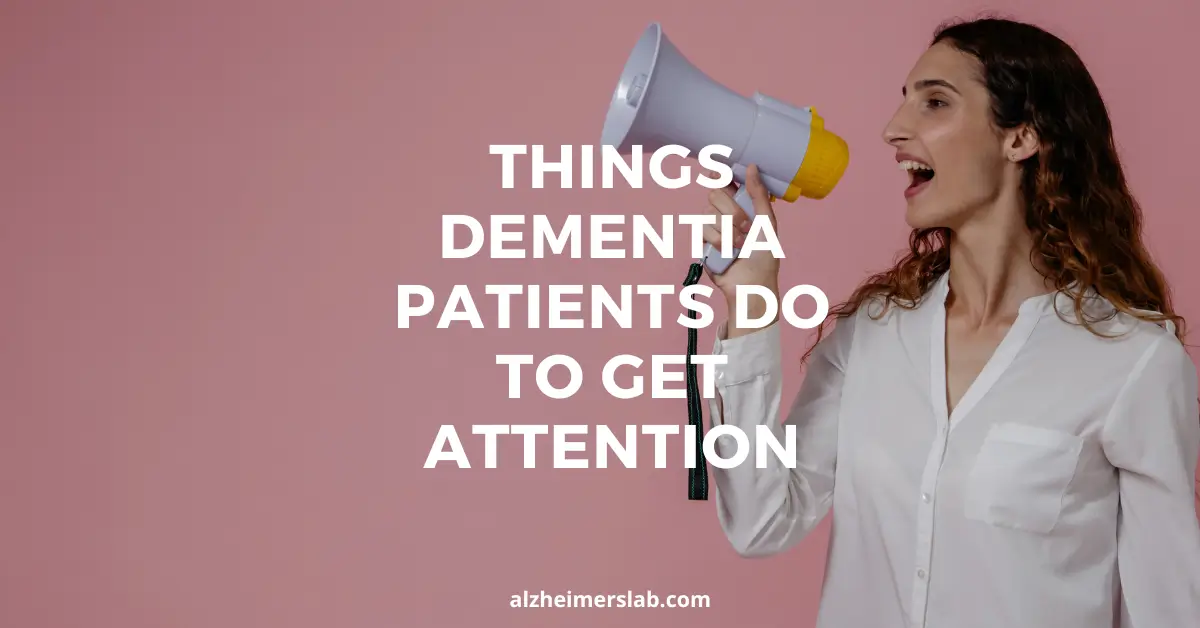10 Things Dementia Patients Do to Get Attention (And What It Really Means)
When someone you care about is living with dementia, it’s not just memory that changes. You might start noticing unusual behaviors—maybe they start yelling more often, or they follow you around the house constantly. It might feel confusing or even frustrating. But here’s something important to understand—sometimes, these actions are just their way of saying, “I need you. Please notice me.”
Many people with dementia do certain things just to get attention because they are scared, confused, or lonely.
They might cry, act out, repeat things, or even become aggressive—not because they want to be difficult, but because they want to feel seen and heard.
1. Repeating the Same Question Again and Again
This is one of the most common things I see in people with dementia. They ask the same thing over and over, even if you just answered a minute ago. It’s not because they forgot your answer (although memory loss is a factor), but often because they want to keep you engaged. They don’t want to be ignored, and asking a question is their way of pulling you back in.
They might ask, “Where is my daughter?” or “What time is lunch?” five times in ten minutes. It can test your patience, but if you look closely, you’ll see they are trying to connect.
2. Pretending to Have More Pain Than They Actually Do

Some people with dementia will say something hurts when it doesn’t. Why? Because when they say “my back hurts” or “my leg is killing me,” they notice that people come closer, speak softly, and show concern.
Pain gets attention. And if someone feels emotionally neglected or left out, they may use this strategy—sometimes without even realizing it. They just know that saying “it hurts” brings comfort.
3. Crying or Whining Loudly for No Clear Reason
If a person with dementia suddenly starts crying out loud, moaning, or whining without a clear cause, it might not be about physical pain. They could be expressing emotional distress.
This kind of crying can be a way to say, “I need company” or “I feel scared.” They may not have the words to say what they feel, so they express it with sound.
4. Getting Angry or Starting Arguments
You might be surprised to know that anger can sometimes be a form of attention-seeking. A person might pick a fight over something small—like refusing to eat or saying something mean.
This doesn’t always mean they’re actually angry. What’s really happening is they feel lost or confused, and starting an argument gives them control or brings you closer to them—even if the attention isn’t positive.
5. Clinging to One Person Constantly

It’s very common for dementia patients to become attached to one person—usually someone they feel safe with. They might follow this person from room to room or refuse to be left alone.
This isn’t just neediness. It’s fear and insecurity. They don’t understand everything around them, so they hold on to the one thing that feels familiar and safe.
6. Faking Confusion in Front of Strangers or Visitors
Some dementia patients act more confused when other people are around. You might notice they suddenly “don’t remember” something they knew this morning, or they exaggerate their memory problems in front of a visitor.
This can be a way of drawing attention or sympathy. Visitors usually become softer, more gentle, and more caring when they see confusion. It’s a subconscious way to get emotional support.
7. Refusing Food or Medication

Refusing to eat or take pills can be a form of silent protest or a cry for attention. It can also be about control—when they feel they have lost control over everything else, refusing food or medicine becomes a powerful move.
It’s like saying, “Notice me. I’m still here, and I have a choice.”
8. Making Up Stories That Didn’t Happen
Sometimes, people with dementia will start telling wild stories. They might say someone stole their money or that they saw someone outside the window. These things may not be true, but they grab attention.
They may not be lying on purpose. Their brain is confused, and these stories help them make sense of the world—or get others to stop and listen to them for a while.
9. Dressing Improperly or Taking Clothes Off in Public
Odd dressing habits or even undressing in front of others can be shocking, but it’s something many caregivers deal with. It may not always be about discomfort—it could be a way to draw someone’s attention fast.
They may not know how else to express that something feels wrong, or they may want to be noticed and helped.
10. Wandering Off Without Warning
Wandering is a major safety issue. But at times, it may happen because the person wants someone to come find them. If they feel ignored or left out, wandering becomes a way to get noticed—especially if they realize that people start searching when they’re gone.
It’s not always about wanting to leave. Sometimes, it’s just about being seen and cared for.
Why Do Dementia Patients Seek Attention?
This question often comes up, especially from caregivers who are tired and overwhelmed. Here’s the thing—people with dementia are not “faking it” or being dramatic. They are struggling.
Their brain isn’t working the way it used to. Their world feels smaller, scarier, and more confusing. Many of them feel invisible, forgotten, or useless. So, they look for ways to feel important again.
I suggest you watch this youtube video by Dr Natalie
Attention is not just about noise or fuss—it’s about human connection. It’s about needing someone to see them, touch them, talk to them, and remind them they still matter.
How Can You Help Without Getting Burnt Out?
You don’t have to give nonstop attention 24/7. But here are some ideas to meet their emotional needs in small, manageable ways:
| What They Do | What You Can Try Instead |
|---|---|
| Repeat questions | Sit with them and talk gently for 5 minutes |
| Fake pain | Offer touch—like a hand rub or soft hug |
| Cry or moan | Ask, “Do you feel lonely?” and offer a calm moment |
| Start arguments | Stay calm, validate their feelings, then distract |
| Wander around | Give them a simple task or something to hold |
| Refuse food | Ask what’s bothering them or offer a small treat |
| Make stories | Listen, then gently shift to a safe topic |
These don’t take much time but can make a huge difference.
Key Points to Remember
- Dementia patients seek attention because they feel scared or lonely
- Repeating questions is often a call for company
- Fake pain or crying may be a need for emotional care
- Anger and arguments might come from confusion, not hatred
- Clinging to one person is about safety and trust
- Refusing food or medicine can be a way to get control
- Odd behaviors like undressing or wandering often signal distress
- Made-up stories may be a cry for attention or understanding
- Attention-seeking is not manipulation—it’s human need
- A little patience and kindness go a long way
Thanks for reading. I hope the article helped. If you have any questions, comment below. And share with friends and family on social media.

